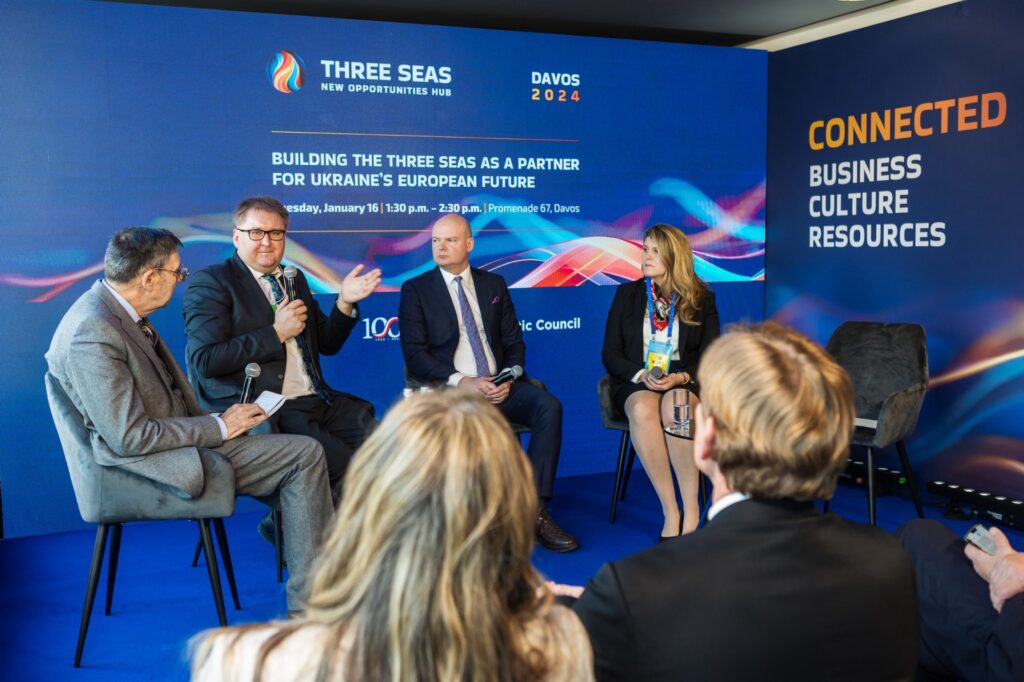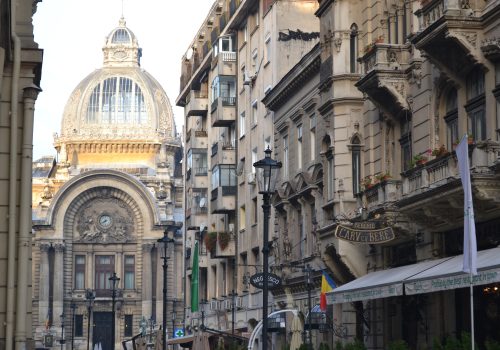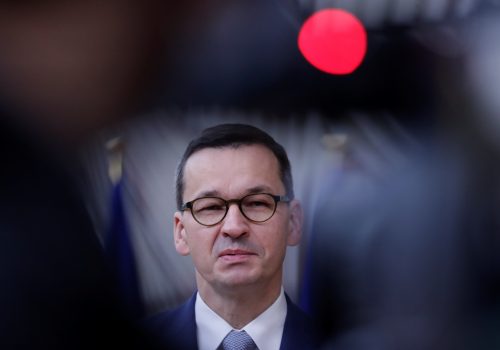Watch the event
Ukraine needs two things to emerge as a “dynamic” regional power after facing Russia’s aggression, according to former Estonian President Kersti Kaljulaid: a “security guarantee” provided by “victory,” and an “economic security guarantee” provided by advancements in its path to European Union (EU) membership.
Kaljulaid outlined these requirements for Ukraine’s rebuilding after the war on January 16 at the Three Seas Hub in Davos, Switzerland, on the sidelines of the World Economic Forum. Hosted by Bank Gospodarstwa Krajowego and the Atlantic Council’s Europe Center, the panel gathered private-sector and government leaders to discuss accelerating Ukraine’s integration into Europe.
Ukraine used to see itself as an “east-west transit country,” or Europe’s gateway eastward, explained Ukrainian Deputy Economy Minister Taras Kachka. But now, with Russia isolated, Ukraine sees itself as “the end country for [the] eastern direction” of trade, investment, and connectivity, among other flows.
As Ukraine works to become more integrated with its European partners, it (along with Moldova) has become an associate member in the Three Seas Initiative, a group of thirteen countries that focuses on improving transport, economic, and digital connectivity across the region that sits between incl the Baltic, Black, and Adriatic seas. Looking forward, Kachka said that Ukraine sees itself becoming a member of the initiative.
Below are highlights from the conversation—moderated by John E. Herbst, senior director of the Atlantic Council’s Eurasia Center—which touched upon what Ukraine can bring to the Three Seas Initiative and how the initiative can support Ukraine’s reconstruction.
Reaping the rewards
- Following Russia’s full-scale invasion of Ukraine in 2022, the flow of goods—including food and energy—and people across the region changed dramatically. Now, the Three Seas Initiative has created a “new understanding,” Kachka said, of the importance of infrastructure for defense, energy security, digital connection, and much more.
- Granting Ukraine—and Moldova—membership in the Three Seas Initiative would be a “bold step” in supporting Kyiv’s cause, said Lenna Koszarny, founding partner and chief executive officer of Horizon Capital, a private equity firm that has raised nearly eight hundred million dollars in investments for Ukraine. The membership, she argued, would give member countries a better opportunity to help Ukraine in its reconstruction. But on the whole, she added, Ukraine’s membership in the initiative “brings more” to the Three Seas Initiative “than ultimately for Ukraine.”
- Marek Tomczuk, member of the management board at Bank Gospodarstwa Krajowego, explained that the Three Seas Initiative, as it supports Ukraine, is focusing on “modernization” as well as reconstruction. And with Ukraine’s resources—including energy supplies, rare earth minerals, its tech ecosystem, and more—there is now a “huge chance” for Ukraine and the Three Seas region to together “make some kind of leapfrog in terms of new technologies [and] new modern infrastructure.”
- The Three Seas Initiative maintains an investment fund for infrastructure projects across the region. Kachka said that the fund should look to improve electricity infrastructure across Central and Eastern Europe—specifically projects that connect with Ukraine—and Ukraine’s busy road connections with Poland. Tomczuk pointed to the need for high-speed digital connectivity with the wider world.
- Kaljulaid admitted that the Three Seas Initiative hasn’t gathered the funding that its members initially hoped; “but I think the bright future is still ahead of us.”
Weighing the risks
- Kaljulaid argued that despite Ukraine’s proven ability to defend itself, the war has increased the perceived investment risk in Ukraine, which could discourage the private sector from providing needed reconstruction funds.
- Kacka noted that perceived investment risk extends across the region, and thus it is important to shore up Central and Eastern European defense infrastructure. Tomczuk noted that many of the Three Seas members are post-Soviet countries transitioning away from Russian military equipment and toward equipment that meets NATO standards, which “is very important in terms of communication… [and] cooperation” but difficult to fund.
- Kaljulaid argued that “some kind of guarantee funds need to be arranged.” Kachka agreed, pointing to the potential guarantees under negotiation via the EU’s Ukraine Facility. “These mechanisms [are] important now,” he said.
- In the meantime, the private sector—which has already started making investments in Ukraine–must ramp up its support for rebuilding the country, Koszarny urged. She noted that the efforts to fund post-World War II reconstruction started as early as two years before the war actually ended. Thus, the private sector “cannot stop investment now,” she said.
Katherine Walla is an associate director of editorial at the Atlantic Council.
Watch the full event
Further reading
Wed, Aug 23, 2023
Policy memo: How to sharpen the digital pillar of the Three Seas Initiative
New Atlanticist By Jörn Fleck, Akshat Dhankher, James Batchik
The Three Seas Initiative and its digital pillar currently lack the credibility needed to attract sustained investments.
Thu, Aug 31, 2023
A Three Seas Chamber of Commerce could enhance energy diversification across Central and Eastern Europe
EnergySource By
The Three Seas Initiative (3SI) Summit in Bucharest takes place next week. To catalyze investment and diversify away from Russian energy, the summit should establish a Three Seas Chamber of Commerce, capable of sustaining progress and unleashing the region's full potential.
Thu, May 6, 2021
Polish Prime Minister Morawiecki on the COVID comeback, the Three Seas Initiative, and where the US is falling short
The Three Seas Initiative By
The Polish leader joined the Atlantic Council's EU-US Future Forum to discuss ways to improve the transatlantic relationship, and the challenges and opportunities in Central Europe.
Image: Ukrainian Deputy Economy Minister Taras Kachka, founding partner and CEO of Horizon Capital Lenna Koszarny, and , member of the management board at Bank Gospodarstwa Krajowego Marek Tomczuk at the Three Seas Hub in Davos, Switzlerland on January 16, 2024.



